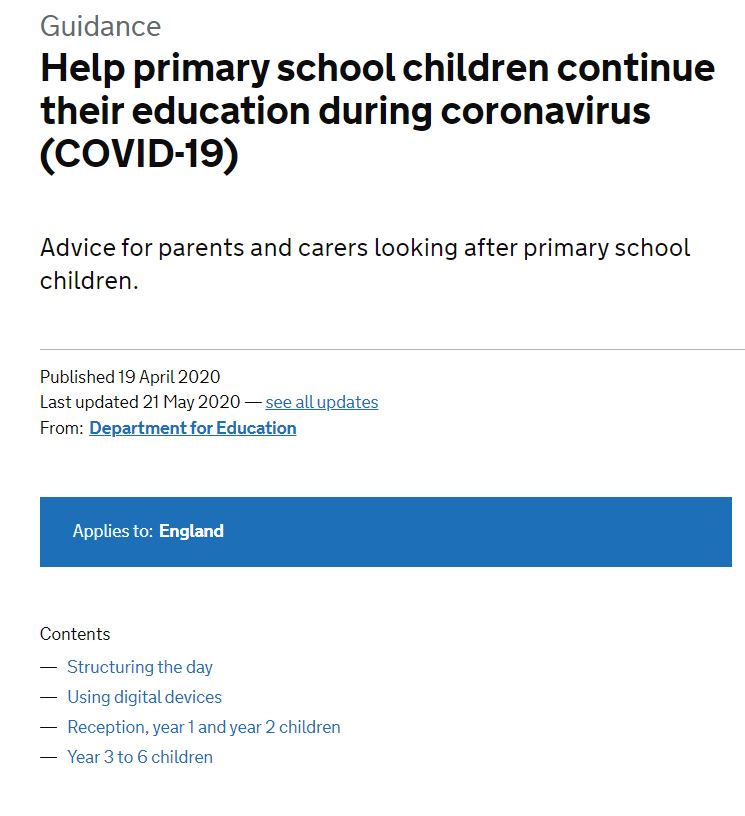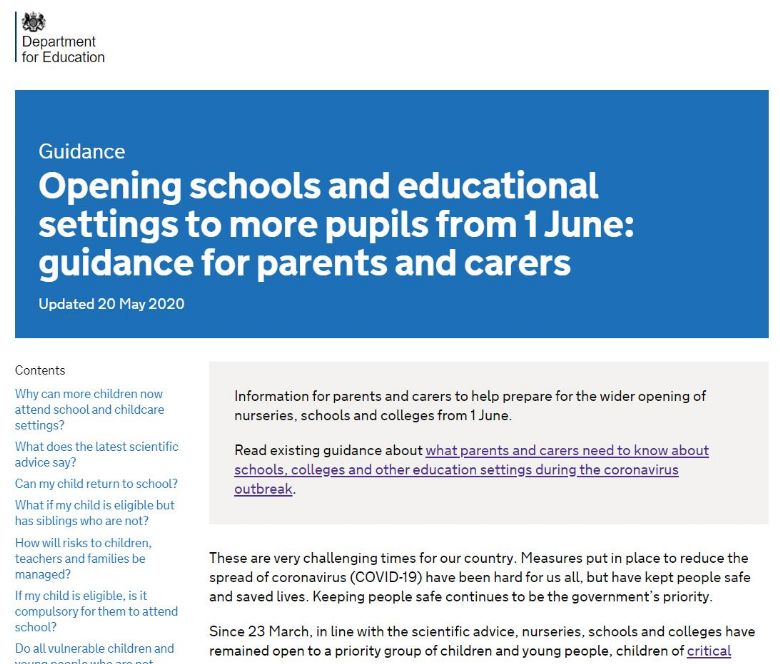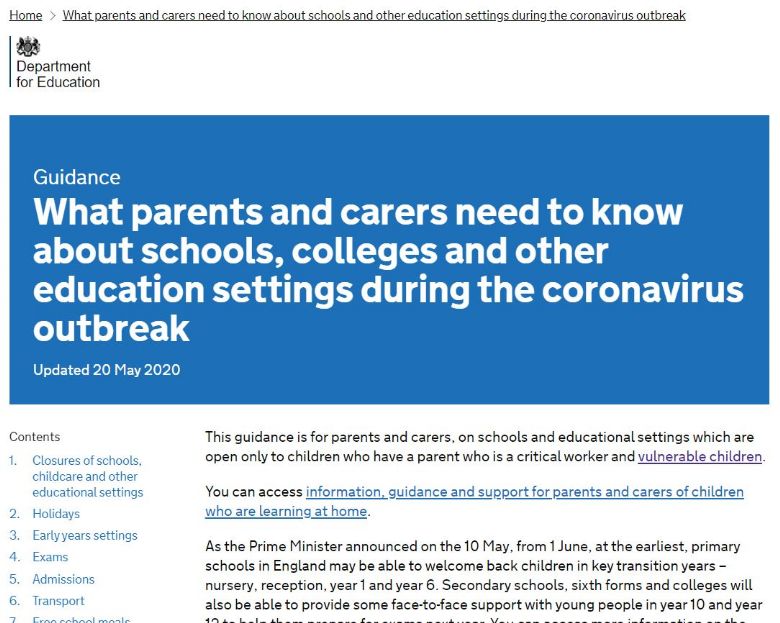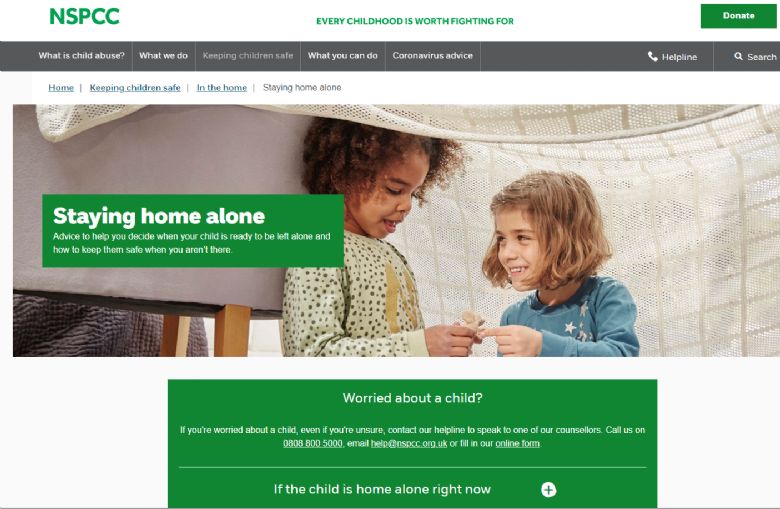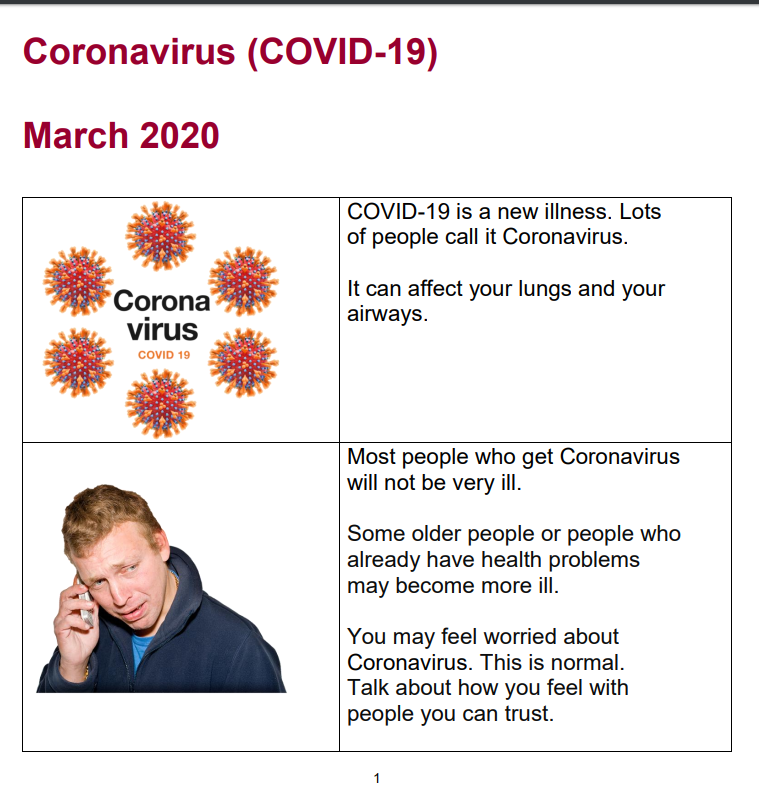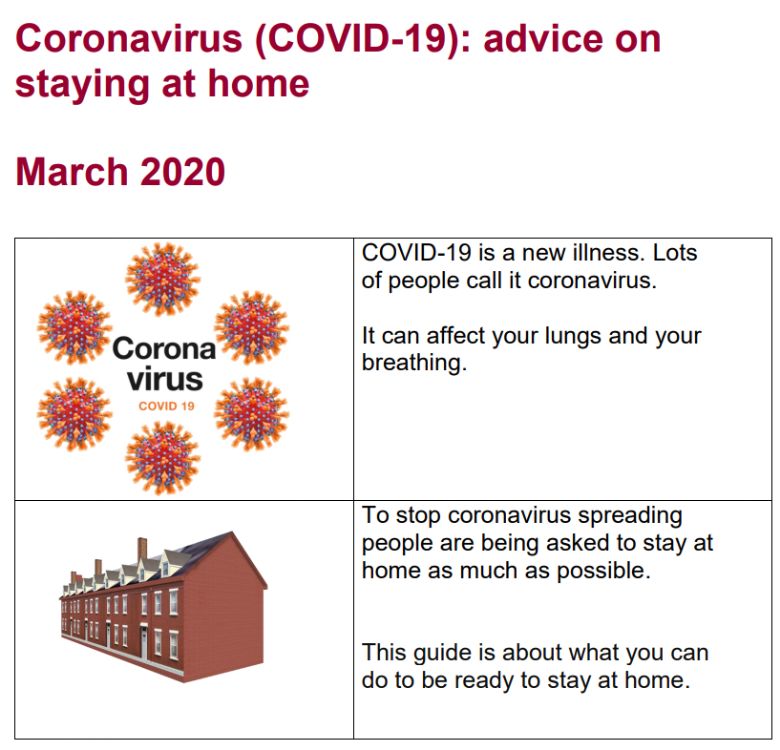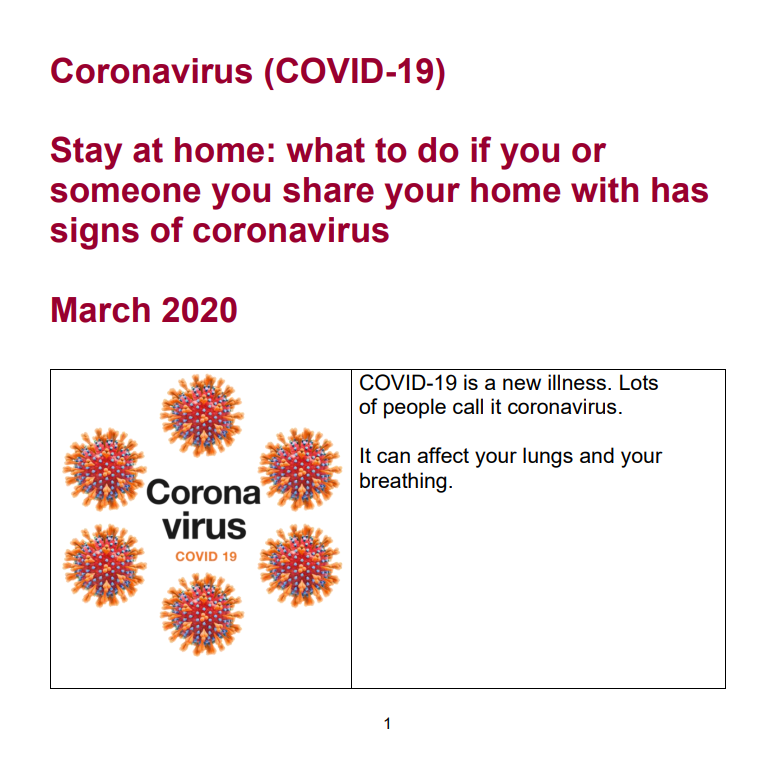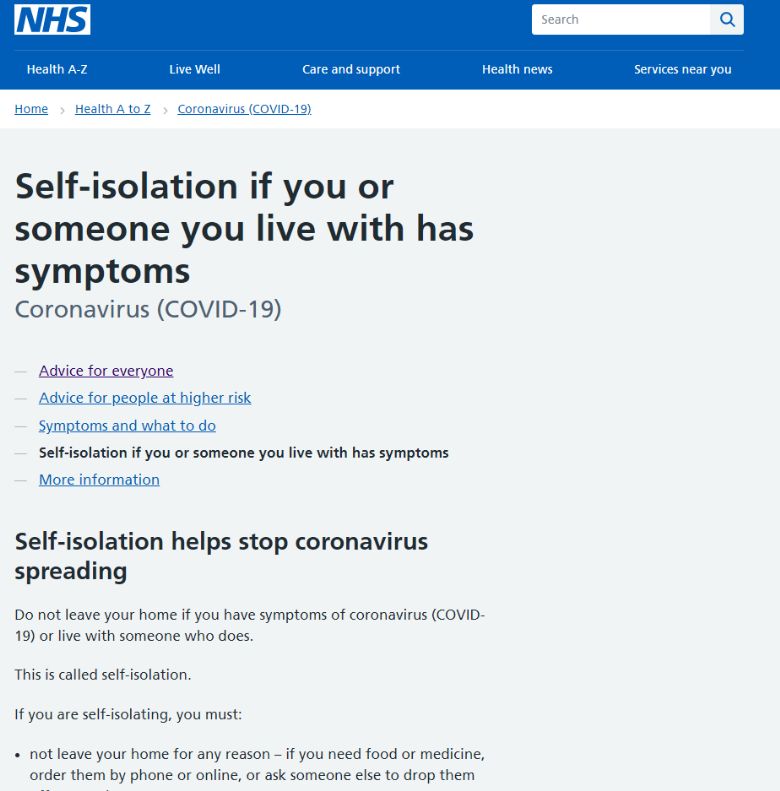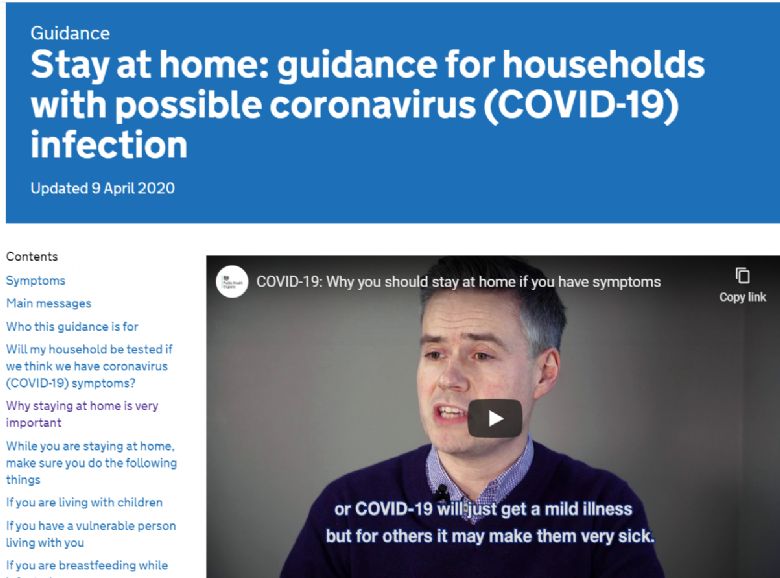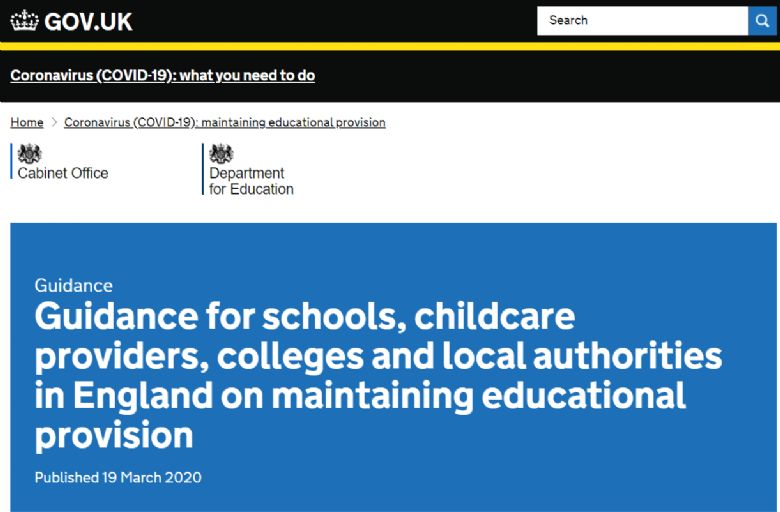National Guidance
National Guidance
There has been a bewildering mass of guidance nationally. We have tried to bring together the critical elements of the guidance from trustworthy sources to ensure families have a 'one stop' area to gain an overview of important information available.
Overview |
Guide |
Government Guidance for Helping Children at HomeWhile staying at home due to coronavirus (COVID-19), parents and carers may be concerned about their children’s education and the effect of missing school. No one expects parents to act as teachers, or to provide the activities and feedback that a school would. Speak to your school, which will be planning work for your child to do. Parents and carers should do their best to help children and support their learning. Alongside any work your child receives from school, try using these online educational resources which have been recommended by teachers and school leaders. |
|
Opening School from 1st JuneInformation for parents and carers to help prepare for the wider opening of nurseries, schools and colleges from 1 June. |
|
DFE - What Parents need to knowThis guidance is for parents and carers, on schools and educational settings which are open only to children who have a parent who is a critical worker and vulnerable children. |
|
Information on school closures for parentsInformation for parents and carers about the closure of schools and other educational settings following the outbreak of coronavirus (COVID-19). The Department for Education will update this page as further guidance becomes available. |
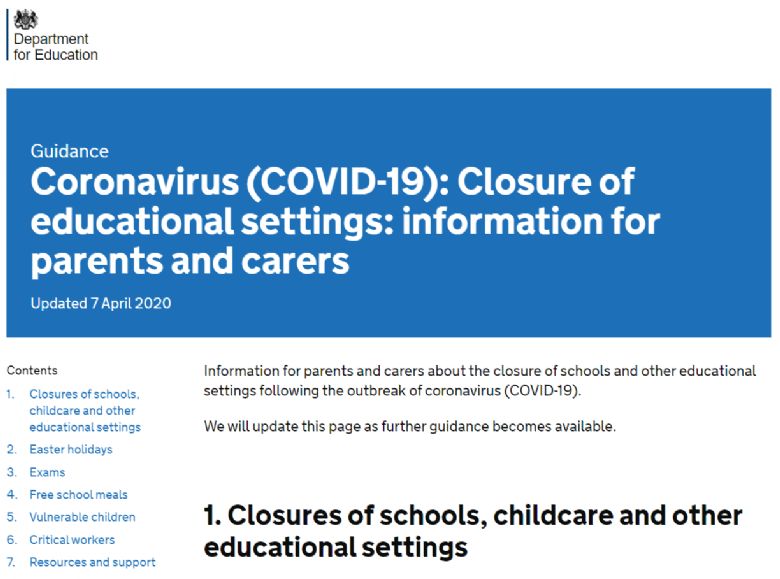 |
The law on leaving your child on their ownThe law doesn’t say an age when you can leave a child on their own, but it’s an offence to leave a child alone if it places them at risk. Use your judgement on how mature your child is before you decide to leave them alone, eg at home or in a car. The National Society for the Prevention of Cruelty to Children (NSPCC) says:
Parents can be prosecuted if they leave a child unsupervised ‘in a manner likely to cause unnecessary suffering or injury to health’. |
|
Easy Read - No Nonsense Guide - Corona VirusThis PDF download is a very easy guide that will be helpful for children and families to focus on the no nonsense messages of importance. |
|
Easy Read - No Nonsense Guide - Staying at homeThis PDF download is a very easy guide that will be helpful for children and families to focus on the no nonsense messages of importance. |
|
Easy Read - No Nonsense Guide - Corona Virus at homeThis PDF download is a very easy guide that will be helpful for children and families to focus on the no nonsense messages of importance. |
|
Easy Read - No Nonsense Guide - Looking After Your FeelingsThis PDF download is a very easy guide that will be helpful for children and families to focus on the no nonsense messages of importance. |
|
NHS Self Isolation GuidanceSelf-isolation if you or someone you live with has symptoms-Coronavirus (COVID-19) |
|
Possible Corona Virus SymptomsThe most common symptoms of coronavirus (COVID-19) are recent onset of:
For most people, coronavirus (COVID-19) will be a mild illness. Main messages
Who this guidance is forThis advice is intended for:
|
|
Will I be counted as a critical worker?Health and social careThis includes but is not limited to doctors, nurses, midwives, paramedics, social workers, care workers, and other frontline health and social care staff including volunteers; the support and specialist staff required to maintain the UK’s health and social care sector; those working as part of the health and social care supply chain, including producers and distributors of medicines and medical and personal protective equipment. Education and childcareThis includes childcare, support and teaching staff, social workers and those specialist education professionals who must remain active during the COVID-19 response to deliver this approach. Key public servicesThis includes those essential to the running of the justice system, religious staff, charities and workers delivering key frontline services, those responsible for the management of the deceased, and journalists and broadcasters who are providing public service broadcasting. Health and social careThis includes but is not limited to doctors, nurses, midwives, paramedics, social workers, care workers, and other frontline health and social care staff including volunteers; the support and specialist staff required to maintain the UK’s health and social care sector; those working as part of the health and social care supply chain, including producers and distributors of medicines and medical and personal protective equipment. Education and childcareThis includes childcare, support and teaching staff, social workers and those specialist education professionals who must remain active during the COVID-19 response to deliver this approach. Key public servicesThis includes those essential to the running of the justice system, religious staff, charities and workers delivering key frontline services, those responsible for the management of the deceased, and journalists and broadcasters who are providing public service broadcasting. Local and national governmentThis only includes those administrative occupations essential to the effective delivery of the COVID-19 response, or delivering essential public services, such as the payment of benefits, including in government agencies and arms length bodies. Food and other necessary goodsThis includes those involved in food production, processing, distribution, sale and delivery, as well as those essential to the provision of other key goods (for example hygienic and veterinary medicines). Public safety and national securityThis includes police and support staff, Ministry of Defence civilians, contractor and armed forces personnel (those critical to the delivery of key defence and national security outputs and essential to the response to the COVID-19 pandemic), fire and rescue service employees (including support staff), National Crime Agency staff, those maintaining border security, prison and probation staff and other national security roles, including those overseas. TransportThis includes those who will keep the air, water, road and rail passenger and freight transport modes operating during the COVID-19 response, including those working on transport systems through which supply chains pass. Utilities, communication and financial servicesThis includes staff needed for essential financial services provision (including but not limited to workers in banks, building societies and financial market infrastructure), the oil, gas, electricity and water sectors (including sewerage), information technology and data infrastructure sector and primary industry supplies to continue during the COVID-19 response, as well as key staff working in the civil nuclear, chemicals, telecommunications (including but not limited to network operations, field engineering, call centre staff, IT and data infrastructure, 999 and 111 critical services), postal services and delivery, payments providers and waste disposal sectors. If workers think they fall within the critical categories above, they should confirm with their employer that, based on their business continuity arrangements, their specific role is necessary for the continuation of this essential public service. If your school is closed, then please contact your local authority, who will seek to redirect you to a local school in your area that your child, or children, can attend. This only includes those administrative occupations essential to the effective delivery of the COVID-19 response, or delivering essential public services, such as the payment of benefits, including in government agencies and arms length bodies. Food and other necessary goodsThis includes those involved in food production, processing, distribution, sale and delivery, as well as those essential to the provision of other key goods (for example hygienic and veterinary medicines). Public safety and national securityThis includes police and support staff, Ministry of Defence civilians, contractor and armed forces personnel (those critical to the delivery of key defence and national security outputs and essential to the response to the COVID-19 pandemic), fire and rescue service employees (including support staff), National Crime Agency staff, those maintaining border security, prison and probation staff and other national security roles, including those overseas. TransportThis includes those who will keep the air, water, road and rail passenger and freight transport modes operating during the COVID-19 response, including those working on transport systems through which supply chains pass. Utilities, communication and financial servicesThis includes staff needed for essential financial services provision (including but not limited to workers in banks, building societies and financial market infrastructure), the oil, gas, electricity and water sectors (including sewerage), information technology and data infrastructure sector and primary industry supplies to continue during the COVID-19 response, as well as key staff working in the civil nuclear, chemicals, telecommunications (including but not limited to network operations, field engineering, call centre staff, IT and data infrastructure, 999 and 111 critical services), postal services and delivery, payments providers and waste disposal sectors. If workers think they fall within the critical categories above, they should confirm with their employer that, based on their business continuity arrangements, their specific role is necessary for the continuation of this essential public service. If your school is closed, then please contact your local authority, who will seek to redirect you to a local school in your area that your child, or children, can attend. |

